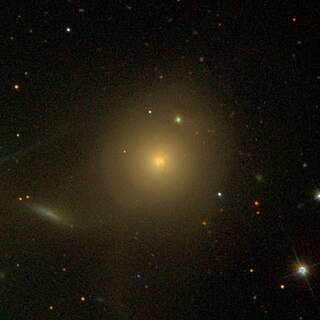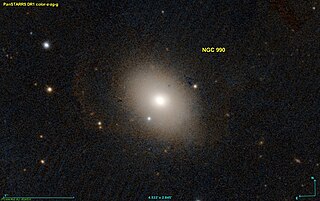
NGC 5821 is a spiral galaxy with a ring structure in the constellation Boötes. It lies near a similarly massed galaxy, NGC 5820, at the same redshift. Both galaxies were discovered by the astronomer William Herschel.

NGC 5614 is an unbarred spiral galaxy in the constellation Boötes. It is the primary member of the Arp 178 triplet of interacting galaxies with NGC 5613 and NGC 5615.

NGC 5545 is a spiral galaxy in the northern constellation of Boötes. It is interacting with the barred spiral galaxy NGC 5544.

NGC 467 is an unbarred lenticular galaxy in the constellation Pisces. It was discovered on 8 October 1785 by William Herschel.

NGC 5030 is a barred spiral galaxy in the constellation Virgo. The object was discovered on 17 March 1881 by the American astronomer Edward Singleton Holden.

NGC 1683 is a spiral galaxy in the constellation Orion. The object was discovered in 1850 by the Irish astronomer William Parsons.

NGC 950 is a barred spiral galaxy in the constellation Cetus. It is approximately 205 million light-years away from the Solar System and has a diameter of about 85,000 light-years. The object was discovered in 1886 by American astronomer and mathematician Ormond Stone.

NGC 990 is an elliptical galaxy located in the constellation Aries about 153 million light-years from the Milky Way. It was discovered by the German - British astronomer William Herschel in 1786.

NGC 670 is a lenticular galaxy located in the Triangulum constellation about 165 million light years from the Milky Way. It was discovered by the German-British astronomer William Herschel in 1786.

NGC 790 is a lenticular galaxy in the constellation Cetus. It is estimated to be 233 million light-years from the Milky Way and has a diameter of approximately 90,000 light years. NGC 790 was discovered on September 10, 1785 by the German-British astronomer William Herschel.

NGC 550 is a spiral galaxy in the constellation Cetus. It is estimated to be about 300 million light-years from the Milky Way and has a diameter of approximately 110,000 light years. The German-British astronomer William Herschel discovered it on 8 October 1785.

NGC 904 is an elliptical galaxy in the constellation Aries. It is estimated to be 244 million light years from the Milky Way and has a diameter of approximately 85,000 ly. NGC 904 was discovered on 13 December 1884 by the astronomer Edouard Stephan.

NGC 906 is a barred spiral galaxy in the constellation Andromeda in the northern sky. It is estimated to be 215 million light years from the Milky Way and has a diameter of approximately 110,000 ly. NGC 906 was discovered on October 30, 1878 by astronomer Édouard Stephan.

NGC 804 is a lenticular galaxy located in the Triangulum constellation about 231 million light-years from the Milky Way. It was discovered by the American astronomer Lewis Swift in 1885. This galaxy was also observed by the French astronomer Guillaume Bigourdan on December 24, 1897, and it has been added to the Index Catalogue under the symbol IC 1773.

NGC 996 is an elliptical galaxy of the Hubble type E0 in the constellation Andromeda. It is estimated to be 210 million light years from the Milky Way and has a diameter of approximately 75,000 ly. It was discovered on December 7, 1871 by astronomer Édouard Stephan.

NGC 766 is an elliptical galaxy located in the Pisces constellation about 362 million light years from the Milky Way. It was discovered by British astronomer John Herschel in 1828.

NGC 768 is a barred spiral galaxy located in the constellation Cetus about 314 million light years from the Milky Way. It was discovered by the American astronomer Lewis Swift in 1885.

NGC 645 is a barred spiral galaxy in the constellation Pisces. It is estimated to be 112 million light-years from the Milky Way and has a diameter of approximately 115,000 light years. The object was discovered on October 27, 1864 by astronomer Albert Marth.

NGC 623 is a large elliptical galaxy located in the Sculptor constellation at a distance of about 400 million light-years away from the Milky Way. It was discovered by British astronomer John Herschel on 30 November 1837.

NGC 861 is a spiral galaxy in the constellation Triangulum. It is estimated to be 360 million light-years from the Milky Way and has a diameter of approximately 165,000 light-years. The object was discovered on September 18, 1865 by Heinrich d'Arrest.




















